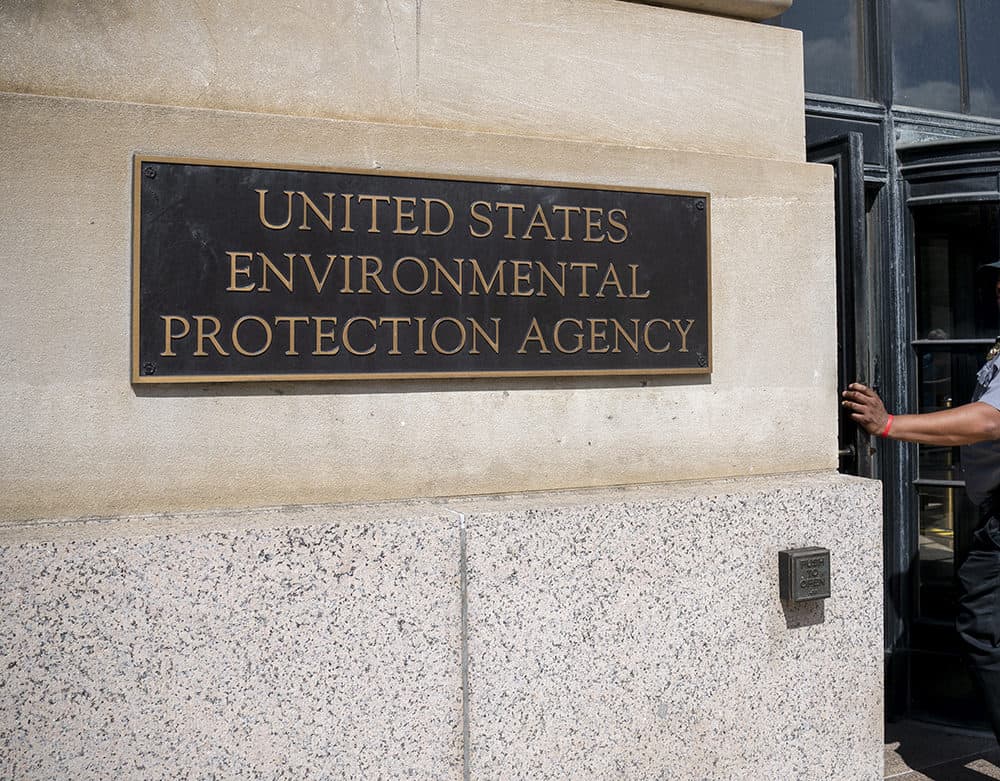Advertisement
Covering Climate
Union Of Concerned Scientists Say Trump Administration's EPA Rollbacks Are Stifling Science

This conversation is part III of our three-part series called "Silencing Science."
The Environmental Protection Agency is drastically reducing how many waterways receive federal protection under the Clean Water Act. The controversial move — welcomed by farmers but opposed by many of the EPA’s own scientists and President Trump appointees — is to correct federal overreach, officials say.
The Union of Concerned Scientists disagrees, saying instead it stifles science at a time when climate change is escalating.
“Across the board, science has been sidelined from decision making at the EPA with significant consequences for both public health and the environment,” says Michael Halpern, the deputy director of the Center for Science and Democracy at the Union of Concerned Scientists.
For example, in 2017, a new report on the cancer risks of formaldehyde — a common chemical found in a variety of products such as plywood and glue — hasn't been released. The Union of Concerned Scientists says it was suppressed; the EPA claims it’s still checking the accuracy.
According to the Union of Concerned Scientists, the EPA has also relaxed rules on asbestos, a known carcinogen, in consumer products. Last year, top officials at the EPA advanced a measure which will allow manufacturers to use asbestos in some special cases.
Halpern says scientists were “unequivocal” in making known that asbestos is a dangerous mineral fiber that must be phased out. He says scientists were not consulted before the asbestos rollbacks, and they were informed just like the public was — through media reports and the agency’s official announcement.
“What we're seeing is the wholesale sidelining of agency experts from important processes that are supposed to protect public health,” he says.
Advertisement
Andrew Wheeler, head of the EPA, claimed the move would “allow for the restriction of asbestos manufacturing and processing of new uses of asbestos.” Yet critics aren’t so sure, based off of Wheeler’s past. Some have long expressed their concern with Wheeler, a lawyer who lobbied for the coal industry against then-President Barack Obama’s administration's environmental regulations.
In a statement, EPA spokesman Michael Abboud says, “As required by law EPA has always and will continue to use the best available science when developing rules, regardless of the claims of a few federal employees.”
Abboud also says under Trump, the agency “has worked to put forward the strongest regulations to protect human health and the environment.”
But Halpern says asbestos isn’t the only issue at play. The Trump administration has chosen to disregard certain policies, such as the Clean Air Act, in order to pursue their own agenda, he says.
“But the amount of air pollution that's going to sicken you or kill you doesn't depend on who wins an election or who is filling a seat at the top of the EPA,” he says. “That's why we need the scientists to be able to tell us what the threats are and respond appropriately.”
Scientists are feeling this neglect, he says. The Union of Concerned Scientists conducts surveys, and Halpern says recent feedback found that EPA scientists are “worse off than they've ever been” and “report significant political interference in their work.”
The survey found they are also discouraged by workplace reductions, and feel the need to self-censor on topics such as climate change or chemical safety, he says. Their contentious work environment ultimately makes it challenging to report the facts back to the public on critical health hazards, he says.
The impact may be damning, Halperin says. The EPA has to reevaluate standards on particulate matter, an air pollutant that makes asthma worse, he says. Yet the agency has been “doing their best to sabotage that scientific process through which those standards are set” by eliminating a panel of the country’s top particulate matter experts. The EPA claims their expertise was no longer needed, he says.
Those experts decided to hold their own public meeting in order to share their findings and “set the record straight on what they believe a sufficiently protective standard would be” — a standard that regulates whether the air we all breathe is sufficiently safe, Halpern explains.
The beauty of the EPA is that officials need to prove their work when enacting science-based laws such as the Clean Water Act, he says.
“They have to be able to justify their decisions based on scientific information,” he says. “That's one reason why you've seen a lot of criticism, even from scientists who have been appointed by President Trump.”
With bipartisan support, six House Republicans joined 19 Democrats to pass the Scientific Integrity Act out of committee in 2019, a bill which makes it illegal to distort or suppress scientific research. The bill now goes to the full House for approval.
Halpern testified before the committee in favor of the act. He thinks both political parties “believe in science” considering Democrats and Republicans benefit from science in policy making, he says. He just doesn’t want politicians to get in the way of making scientists’ findings –– positive or negative –– open to the public.
“Science policy is sexy right now,” he says. “And we're going to try to do our best to make sure that that enthusiasm doesn't wane.”
Cassady Rosenblum produced and edited this interview for broadcast with Kathleen McKenna. Serena McMahon adapted it for the web.
This segment aired on February 5, 2020.

